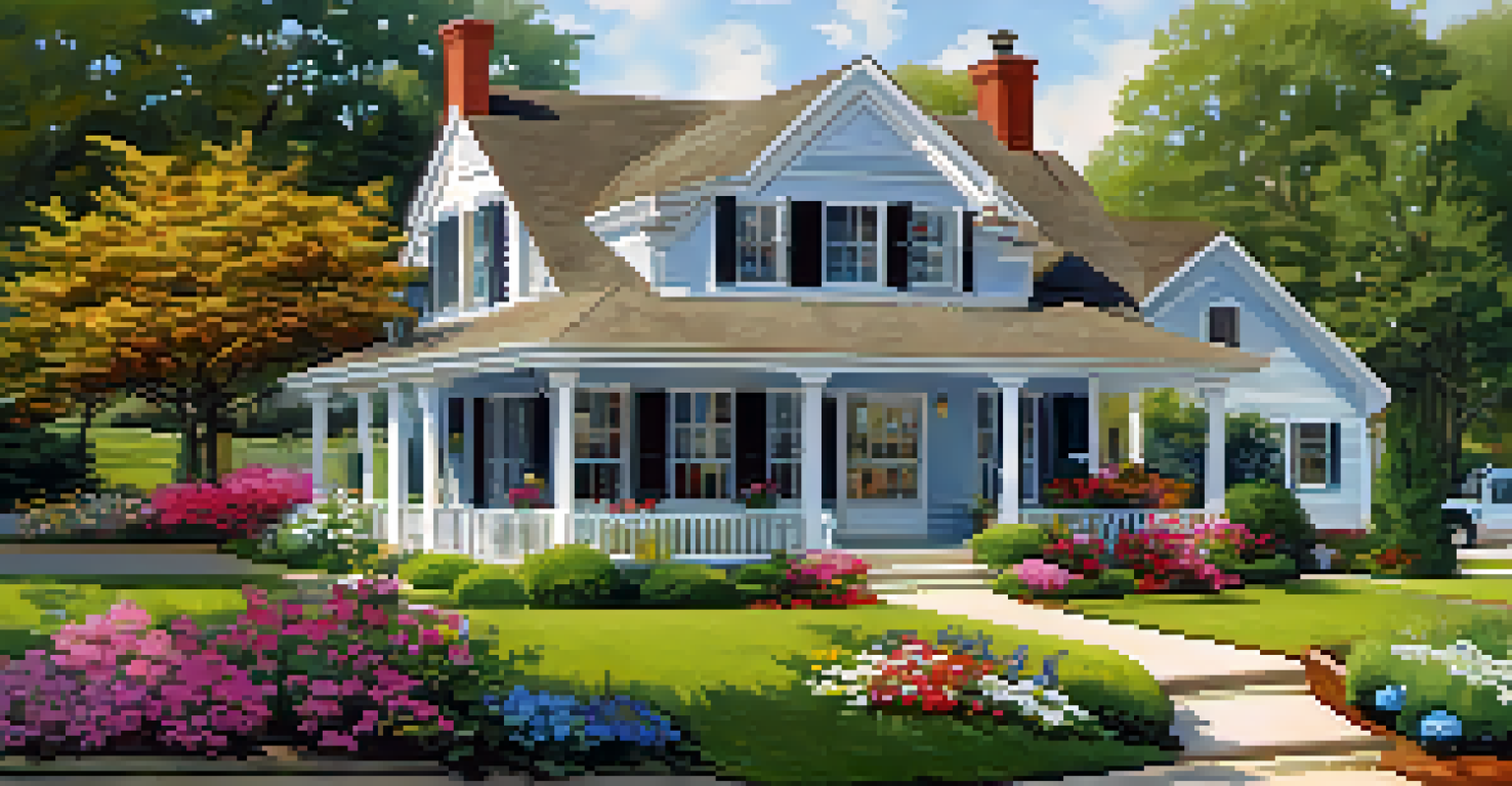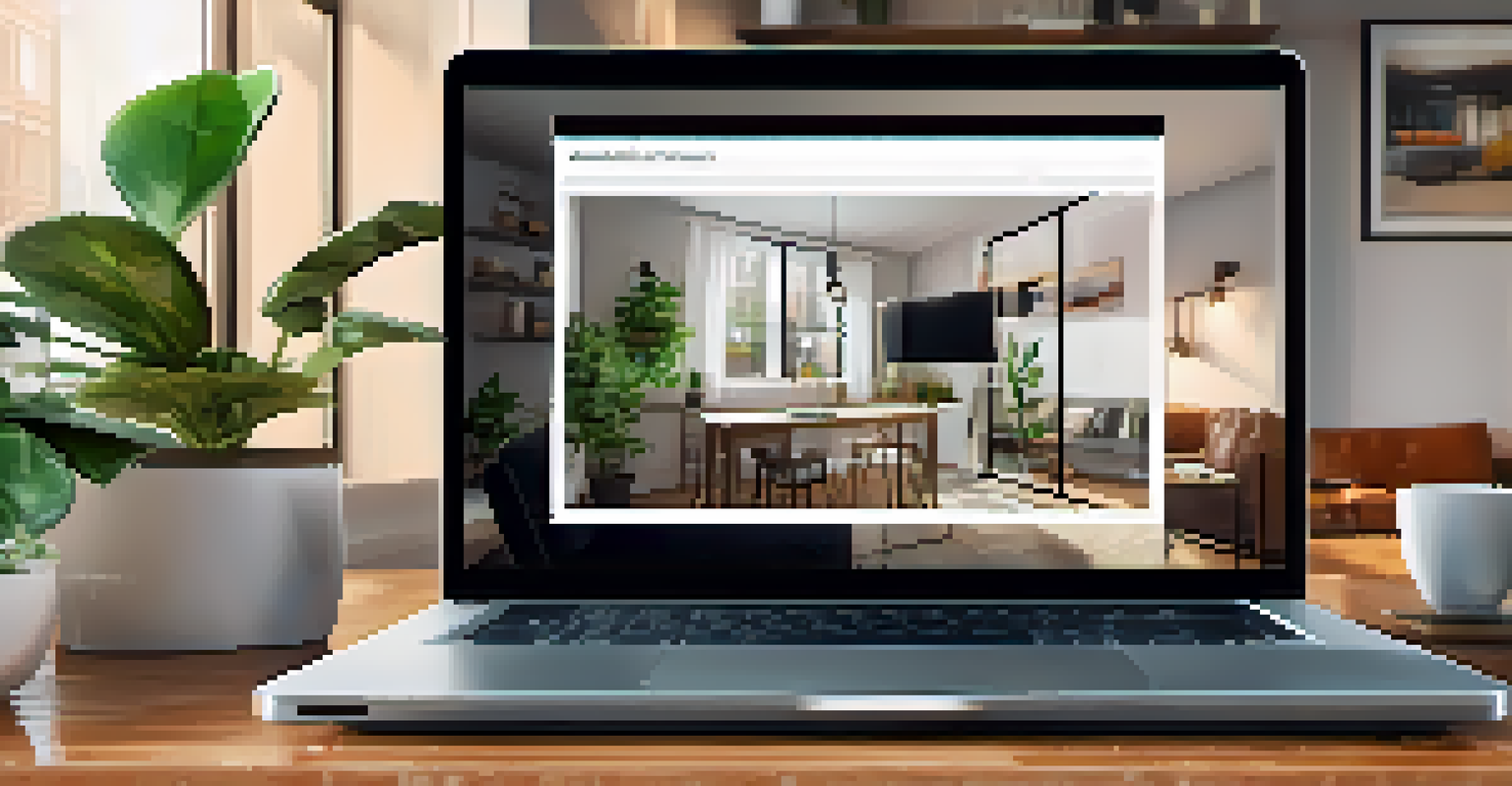The Evolution of Open House Marketing Techniques

The Traditional Open House: A Classic Approach
Open houses have been a staple in real estate marketing for decades, serving as a way for sellers to showcase their homes to potential buyers. Traditionally, these events involved inviting anyone interested to walk through the property, often with a friendly agent on hand to answer questions. This face-to-face interaction allowed for personal connections, which are crucial in building trust. However, while this method has its charm, it often relied solely on local foot traffic and word-of-mouth to draw visitors.
The best marketing doesn't feel like marketing.
In these early days, the marketing efforts were quite basic, often limited to flyers, yard signs, and perhaps a mention in the local newspaper. Real estate agents would spend hours preparing a home for viewing, ensuring it looked its best. The excitement of seeing a home in person was a big draw, but it also meant that agents had to work harder to generate interest, often relying on their personal networks. This approach worked well for its time but had its limitations in reaching a broader audience.
As the internet began to emerge, the traditional open house started to evolve, paving the way for new marketing techniques that could enhance visibility and reach. The classic approach laid the groundwork for future innovations, showing that personal connection remains vital, even as technology begins to take the forefront.
The Rise of Digital Marketing in Real Estate
With the advent of the internet, real estate marketing saw a significant shift. Agents began to harness the power of online listings, social media, and email campaigns to promote open houses, reaching a much wider audience. This digital revolution allowed for high-quality photos and virtual tours to be shared, showcasing properties in a way that traditional marketing simply couldn't. As consumers became more tech-savvy, the demand for accessible information about homes skyrocketed.

Social media platforms like Facebook and Instagram provided a new way to engage potential buyers, allowing agents to create targeted ads and share live videos of open houses. This shift not only broadened the reach but also allowed for more creative marketing strategies. Instead of relying solely on physical attendance, agents could now engage with viewers online, answering questions and providing insights in real time. The digital landscape transformed the open house experience, making it more interactive and dynamic.
Digital Marketing Transforms Open Houses
The shift to digital marketing has expanded the reach of open houses, allowing agents to engage with a wider audience through online listings and social media.
However, this new approach also required agents to adapt quickly. They needed to develop a strong online presence and learn to leverage digital tools effectively. The challenge was to maintain the personal touch that open houses once provided, even when interacting through a screen. Balancing traditional methods with modern technology became the key to successful open house marketing.
Virtual Tours: A Game Changer for Open Houses
As technology advanced, virtual tours emerged as a revolutionary tool for real estate marketing. These immersive experiences allow potential buyers to explore homes from the comfort of their own couches, making it easier to narrow down their choices before setting foot in a property. Virtual tours can highlight every corner of a home, giving viewers a comprehensive sense of the space without the need for physical presence. This convenience is particularly appealing for busy buyers or those relocating from different areas.
In the world of real estate, the most important thing is location, location, location. But the second most important thing is marketing, marketing, marketing.
The incorporation of 3D technology and video walkthroughs brought a new dimension to open houses, making them more engaging and informative. These tours can be shared widely online, attracting interest from buyers who may have never considered the property otherwise. Additionally, they provide an excellent opportunity for agents to showcase their marketing skills, presenting homes in the best light possible. The ability to reach audiences beyond local boundaries opened up new possibilities for sales.
However, while virtual tours enhance the experience, they also present a challenge: they can't fully replace the emotional connection created during in-person visits. Buyers still value the opportunity to walk through a home, feel the space, and picture themselves living there. Successful agents now find a balance between virtual and traditional methods, using technology to complement rather than replace personal interactions.
The Power of Social Media in Open House Promotion
Social media has become a cornerstone of modern marketing strategies, especially in real estate. Platforms like Instagram, Facebook, and TikTok allow agents to showcase their open houses creatively and effectively. By sharing eye-catching photos, engaging videos, and live streams, agents can generate excitement and buzz around their listings. This organic reach often leads to increased foot traffic, as potential buyers feel more connected to the properties they see online.
Innovative marketing techniques such as social media events and countdowns to open houses have emerged, creating anticipation and urgency among followers. Engaging content like behind-the-scenes looks at properties, agent Q&As, and neighborhood highlights can enhance interest and attract a diverse audience. Furthermore, targeted ads ensure that the right people see the listings, making it easier to connect with serious buyers. This strategic approach makes social media an invaluable tool for promoting open houses.
Virtual Tours Enhance Buyer Experience
Virtual tours provide an immersive way for potential buyers to explore homes from anywhere, making the home-buying process more convenient and dynamic.
However, agents must also navigate the unique challenges of social media, such as algorithm changes and the need for consistent content creation. Building a genuine online presence takes time and effort, but the potential rewards are substantial. By leveraging social media effectively, agents can create a community around their listings, fostering relationships that can lead to successful sales.
Email Marketing: Strengthening Open House Outreach
Email marketing remains one of the most effective ways to reach potential buyers, and it plays a crucial role in promoting open houses. By creating a targeted email list, agents can send personalized invitations to their open house events, ensuring that interested buyers receive timely information. This strategy not only keeps potential clients informed but also helps build a rapport, making them more likely to attend. A well-crafted email can create excitement and anticipation for the event.
Agents can enhance their emails by including valuable content, such as tips for home buying, local market updates, or highlights of the property. This additional information positions the agent as a knowledgeable resource, fostering trust with recipients. Including high-quality images and links to virtual tours can further entice readers, making them more likely to take action. This blend of marketing and education can significantly increase engagement and leads.
However, email marketing requires careful planning and execution. It's essential to avoid overwhelming potential buyers with too many messages or irrelevant content. Striking the right balance between promotion and value is key to maintaining interest. By carefully curating their email strategies, agents can effectively use this tool to enhance open house attendance and improve overall marketing efforts.
Leveraging Data Analytics for Targeted Marketing
In today's data-driven world, leveraging analytics has become vital for effective marketing strategies, including open houses. By analyzing past attendance, buyer behavior, and demographic information, agents can identify trends and tailor their marketing efforts accordingly. Understanding which neighborhoods attract the most interest or what features buyers prioritize allows agents to position their properties more effectively. This targeted approach can lead to higher attendance rates and more successful sales.
Data analytics also enables agents to optimize their marketing channels. By tracking which platforms generate the most leads, they can focus their efforts on the strategies that yield the best results. For instance, if social media ads are driving more traffic than email campaigns, agents can allocate resources accordingly. This informed decision-making helps maximize marketing budgets and improve overall effectiveness.
Data Analytics Drives Targeted Outreach
Leveraging data analytics enables agents to tailor their marketing efforts for open houses, leading to higher attendance rates and more successful sales.
However, while data is a powerful tool, it’s essential to maintain the human element in real estate marketing. Interpreting data correctly and using it to inform decisions should complement, rather than replace, personal connections with clients. Balancing data insights with genuine relationships will ultimately lead to more meaningful interactions and successful transactions.
Future Trends: What Lies Ahead for Open House Marketing
As technology continues to advance, the future of open house marketing is likely to be even more innovative and interactive. Emerging technologies such as augmented reality (AR) and artificial intelligence (AI) could further enhance the home-buying experience. Imagine attending a virtual open house where you can visualize changes to a property in real time, or receiving personalized property recommendations based on your preferences. These advancements could redefine how buyers approach home shopping.
In addition, sustainability and eco-friendly features are becoming increasingly important to buyers. Future marketing strategies may emphasize these aspects, showcasing properties with energy-efficient designs or smart home technology. As consumer priorities shift, agents will need to adapt their messaging to resonate with environmentally conscious buyers. Understanding and integrating these trends will be crucial for staying competitive in the market.

Ultimately, the evolution of open house marketing will continue to blend traditional methods with modern technology. The key will always be to create authentic connections while utilizing innovative tools to enhance the experience. By staying ahead of the trends and embracing change, agents can ensure that their open house marketing remains relevant and effective in the ever-evolving real estate landscape.